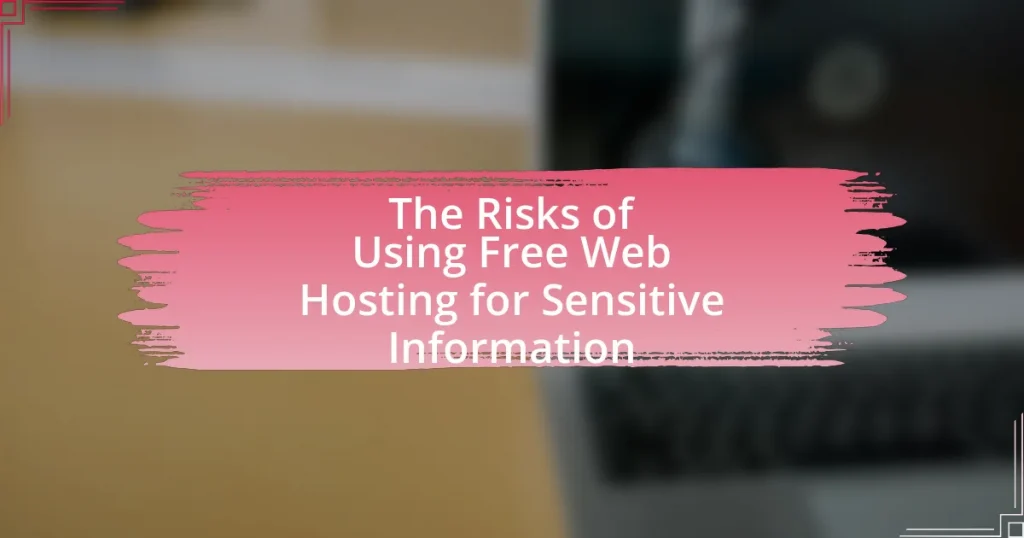The article examines the significant risks associated with using free web hosting services for sensitive information, highlighting vulnerabilities such as data breaches, lack of encryption, and unreliable service. It discusses the appeal of free hosting due to cost-effectiveness and ease of use, while outlining common features and marketing strategies employed by these providers. The article further details specific risks, including limited security measures and potential privacy concerns, and contrasts the security and reliability of free hosting with paid alternatives. Additionally, it addresses the legal ramifications of data breaches and offers best practices for users to enhance data security, emphasizing the importance of safeguarding sensitive information in an increasingly digital landscape.

What are the Risks of Using Free Web Hosting for Sensitive Information?
Using free web hosting for sensitive information poses significant risks, including data breaches, lack of encryption, and unreliable service. Free hosting providers often lack robust security measures, making sensitive data vulnerable to unauthorized access. For instance, a 2020 study by the Cybersecurity and Infrastructure Security Agency found that 60% of free web hosting services do not implement HTTPS, which is essential for encrypting data during transmission. Additionally, free hosting services may monetize user data through ads or sell it to third parties, further compromising privacy. The absence of customer support and potential downtime can also lead to loss of access to critical information.
Why is free web hosting appealing to users?
Free web hosting is appealing to users primarily due to its cost-effectiveness, allowing individuals and small businesses to establish an online presence without financial investment. This accessibility attracts users who may lack the budget for paid hosting services, enabling them to create websites for personal projects, portfolios, or small businesses. According to a survey by HostingAdvice, 70% of users cite cost as the primary reason for choosing free hosting options. Additionally, the ease of use and quick setup offered by many free hosting providers further enhances their attractiveness, as users can launch websites with minimal technical knowledge.
What are the common features of free web hosting services?
Common features of free web hosting services include limited storage space, bandwidth restrictions, and the presence of advertisements on hosted sites. These services typically offer basic website building tools and support for common programming languages, but they often lack advanced features such as custom domain names and enhanced security measures. Additionally, free web hosting providers may impose restrictions on resource usage and may not guarantee uptime or customer support, which can pose risks for users handling sensitive information.
How do free web hosting services market themselves to attract users?
Free web hosting services market themselves to attract users primarily through offering no-cost plans, which appeal to individuals and small businesses seeking budget-friendly options. They often highlight features such as easy setup, user-friendly interfaces, and basic customer support to entice users who may lack technical expertise. Additionally, these services frequently utilize promotional strategies like referral programs, social media advertising, and partnerships with educational institutions to reach a wider audience. For instance, many free hosting providers emphasize their zero-cost entry point as a way to build a user base, which can lead to upselling premium services later.
What specific risks are associated with free web hosting?
Free web hosting poses several specific risks, including limited security, lack of customer support, and potential data loss. Limited security often results from inadequate measures to protect user data, making websites vulnerable to hacking and malware attacks. For instance, a study by the Ponemon Institute found that 60% of small businesses that experienced a cyber attack went out of business within six months. Lack of customer support can lead to prolonged downtime and unresolved technical issues, which can harm a business’s reputation and revenue. Additionally, free hosting services may impose restrictions on data backups, increasing the risk of data loss due to server failures or accidental deletions. These factors collectively highlight the significant risks associated with using free web hosting for sensitive information.
How does data security differ between free and paid hosting services?
Data security significantly differs between free and paid hosting services, primarily due to the level of resources and protections offered. Paid hosting services typically provide robust security measures, including regular backups, SSL certificates, firewalls, and dedicated support, which are essential for safeguarding sensitive information. In contrast, free hosting services often lack these critical security features, making them more vulnerable to data breaches and cyberattacks. For instance, a study by the Cybersecurity & Infrastructure Security Agency (CISA) indicates that free hosting platforms are frequently targeted due to their inadequate security protocols, leading to higher risks of data loss and exposure.
What are the potential privacy concerns with free web hosting?
Free web hosting poses significant privacy concerns primarily due to the lack of robust data protection measures. Users often forfeit control over their data, as free hosting providers may collect, store, and sell personal information to third parties for advertising purposes. Additionally, free hosting services may not implement encryption or secure protocols, making sensitive data vulnerable to interception and unauthorized access. A study by the Electronic Frontier Foundation highlights that many free hosting platforms do not comply with privacy regulations, increasing the risk of data breaches and misuse.
How can free web hosting impact website performance?
Free web hosting can significantly degrade website performance due to limited resources and bandwidth restrictions. Websites hosted on free platforms often experience slower loading times, which can lead to higher bounce rates; studies show that a one-second delay in page load time can reduce conversions by 7%. Additionally, free hosting services may impose restrictions on server uptime and reliability, resulting in frequent downtimes that negatively affect user experience and search engine rankings. Furthermore, the lack of technical support and optimization options can hinder the website’s ability to scale and adapt to traffic demands, ultimately compromising its overall effectiveness.
What limitations do free web hosting services impose on bandwidth and storage?
Free web hosting services typically impose significant limitations on both bandwidth and storage. Bandwidth restrictions often result in a cap on the amount of data that can be transferred to and from the website, which can lead to slow loading times or even downtime if the limit is exceeded. Storage limitations usually restrict the total amount of data that can be stored on the server, often ranging from a few hundred megabytes to a couple of gigabytes. These constraints can hinder website performance and scalability, making it challenging for users to manage larger files or increased traffic effectively.
How can slow performance affect user experience and data handling?
Slow performance significantly degrades user experience and complicates data handling. Users encountering delays may become frustrated, leading to increased bounce rates; studies show that a one-second delay can reduce conversions by 7%. Additionally, slow performance can hinder data processing, resulting in incomplete transactions or lost information, which is critical for sensitive data management. For instance, a report by Google indicates that 53% of mobile site visits are abandoned if a page takes longer than three seconds to load. This highlights the importance of efficient performance in maintaining user engagement and ensuring reliable data handling.

What are the Consequences of Data Breaches on Free Hosting Platforms?
Data breaches on free hosting platforms can lead to significant consequences, including unauthorized access to sensitive information, loss of user trust, and potential legal liabilities. When data breaches occur, hackers can exploit vulnerabilities to access personal data, which may include usernames, passwords, and financial information. This unauthorized access can result in identity theft and financial fraud for users.
Moreover, the loss of user trust can severely impact the reputation of the hosting platform, leading to decreased user engagement and potential loss of customers. According to a study by the Ponemon Institute, 60% of small businesses that experience a data breach go out of business within six months. Additionally, free hosting platforms may face legal repercussions, as they are often required to comply with data protection regulations such as GDPR or CCPA. Non-compliance can result in hefty fines and legal actions, further exacerbating the financial impact of a data breach.
What types of sensitive information are at risk?
Sensitive information at risk includes personal identification details, financial data, login credentials, and health records. These types of information are often targeted by cybercriminals due to their value. For instance, personal identification details can be exploited for identity theft, while financial data can lead to unauthorized transactions. A study by the Identity Theft Resource Center found that in 2020, over 1,100 data breaches exposed more than 300 million sensitive records, highlighting the significant threat to such information when using insecure platforms like free web hosting services.
How can personal data be compromised on free hosting platforms?
Personal data can be compromised on free hosting platforms due to inadequate security measures and lack of encryption. These platforms often do not implement robust security protocols, making them vulnerable to hacking and data breaches. For instance, a study by the Ponemon Institute found that 60% of small businesses experienced a data breach due to poor security practices, which is common among free hosting services. Additionally, free hosting providers may monetize user data through advertising or selling information, further exposing personal data to unauthorized access.
What are the implications of losing sensitive business data?
Losing sensitive business data can lead to significant financial losses, reputational damage, and legal consequences. Financially, businesses may incur costs related to data recovery, regulatory fines, and potential lawsuits; for instance, the average cost of a data breach in 2021 was $4.24 million, according to IBM’s Cost of a Data Breach Report. Reputationally, companies risk losing customer trust and loyalty, which can result in decreased sales and market share. Legally, organizations may face penalties for failing to comply with data protection regulations, such as the GDPR, which imposes fines up to 4% of annual global revenue. These implications underscore the critical importance of safeguarding sensitive data, particularly when using free web hosting services that may lack robust security measures.
What legal ramifications can arise from using free web hosting for sensitive information?
Using free web hosting for sensitive information can lead to significant legal ramifications, including data breaches and violations of privacy laws. Free web hosting services often lack robust security measures, making sensitive data vulnerable to unauthorized access. For instance, under regulations like the General Data Protection Regulation (GDPR), organizations can face hefty fines for failing to protect personal data adequately. In 2021, the UK Information Commissioner’s Office imposed a fine of £20 million on British Airways for a data breach that compromised sensitive customer information, highlighting the legal consequences of inadequate data protection. Additionally, if sensitive information is exposed, individuals or organizations may face lawsuits for negligence or breach of confidentiality, further compounding legal risks.
How do data protection laws apply to free web hosting services?
Data protection laws apply to free web hosting services by imposing obligations on these providers to safeguard personal data and ensure compliance with regulations such as the General Data Protection Regulation (GDPR) in Europe. Free web hosting services, like any other service that processes personal data, must implement appropriate technical and organizational measures to protect that data from unauthorized access, loss, or breaches. For instance, under GDPR, these services are required to obtain explicit consent from users before processing their data and must provide transparency regarding data usage. Failure to comply can result in significant fines, as evidenced by the European Data Protection Board’s enforcement actions, which have levied penalties reaching millions of euros against non-compliant entities.
What responsibilities do users have regarding data security on free hosting platforms?
Users have the responsibility to implement strong passwords and regularly update them on free hosting platforms to enhance data security. This includes using unique passwords for different accounts and enabling two-factor authentication when available. Additionally, users must be vigilant about the types of data they store, avoiding sensitive information that could be compromised due to the inherent vulnerabilities of free hosting services. According to a 2021 study by the Cybersecurity & Infrastructure Security Agency, 60% of data breaches occur due to weak or stolen passwords, highlighting the critical need for users to prioritize password security.

What Alternatives Exist to Free Web Hosting for Sensitive Information?
Paid web hosting services are viable alternatives to free web hosting for sensitive information. These services typically offer enhanced security features, such as SSL certificates, regular backups, and dedicated customer support, which are crucial for protecting sensitive data. For instance, companies like Bluehost and SiteGround provide robust security measures, including firewalls and malware scanning, which significantly reduce the risk of data breaches compared to free hosting platforms. Additionally, paid hosting often includes compliance with data protection regulations, ensuring that sensitive information is handled according to legal standards.
What are the benefits of using paid web hosting services?
Paid web hosting services offer enhanced security, reliability, and customer support compared to free hosting options. These services typically include features such as SSL certificates, regular backups, and advanced security protocols, which protect sensitive information from breaches. Additionally, paid hosting ensures higher uptime rates, often exceeding 99.9%, which is crucial for maintaining website accessibility. Furthermore, paid services provide dedicated customer support, allowing users to resolve issues quickly, which is essential for businesses that rely on their online presence.
How do paid services enhance data security and privacy?
Paid services enhance data security and privacy by providing advanced encryption, dedicated support, and compliance with regulatory standards. These services often implement end-to-end encryption, which protects data during transmission and storage, making it significantly harder for unauthorized parties to access sensitive information. Additionally, paid services typically offer 24/7 customer support, ensuring that any security issues can be promptly addressed. Furthermore, many paid services comply with regulations such as GDPR and HIPAA, which mandate strict data protection measures, thereby enhancing user trust and safeguarding personal information.
What additional features do paid hosting services offer that free ones do not?
Paid hosting services offer enhanced security features, dedicated customer support, and greater storage capacity that free hosting services do not provide. For instance, paid hosting typically includes SSL certificates for secure data transmission, which is crucial for protecting sensitive information. Additionally, paid services often come with 24/7 customer support, ensuring immediate assistance for technical issues, while free services may lack reliable support. Furthermore, paid hosting plans generally offer more storage and bandwidth, allowing for better performance and scalability, which is essential for handling sensitive data effectively.
How can users assess the reliability of web hosting services?
Users can assess the reliability of web hosting services by evaluating uptime guarantees, customer reviews, and support options. Uptime guarantees typically indicate the percentage of time the service is operational, with reputable providers offering at least 99.9% uptime. Customer reviews on platforms like Trustpilot or G2 provide insights into user experiences, highlighting issues such as downtime or poor customer service. Additionally, reliable web hosting services often provide 24/7 customer support through multiple channels, ensuring assistance is available when needed. These factors collectively help users determine the trustworthiness and performance of web hosting services.
What criteria should be considered when choosing a web hosting provider?
When choosing a web hosting provider, key criteria include reliability, security features, customer support, scalability, and pricing. Reliability is crucial as it ensures minimal downtime; for instance, a provider with a 99.9% uptime guarantee is preferable. Security features such as SSL certificates, firewalls, and regular backups protect sensitive information, which is particularly important when considering the risks associated with free web hosting. Customer support should be accessible 24/7 to resolve issues promptly, while scalability allows for growth without needing to switch providers. Lastly, pricing should reflect the value offered, balancing affordability with the necessary features to safeguard sensitive data effectively.
How can user reviews and ratings inform hosting decisions?
User reviews and ratings can significantly inform hosting decisions by providing insights into the reliability, security, and performance of hosting services. For instance, high ratings often correlate with positive user experiences regarding uptime and customer support, which are critical for hosting sensitive information. A study by HostingAdvice found that 70% of users rely on reviews to gauge the trustworthiness of a hosting provider, indicating that user feedback directly influences decision-making. Additionally, negative reviews frequently highlight issues such as data breaches or poor security measures, which are essential considerations when evaluating hosting options for sensitive data.
What best practices should users follow when handling sensitive information online?
Users should follow several best practices when handling sensitive information online, including using strong, unique passwords, enabling two-factor authentication, and ensuring secure connections. Strong passwords, consisting of at least 12 characters with a mix of letters, numbers, and symbols, significantly reduce the risk of unauthorized access, as studies show that 81% of data breaches are linked to weak passwords. Two-factor authentication adds an additional layer of security, making it harder for attackers to gain access even if passwords are compromised. Furthermore, users should always verify that they are using secure connections, indicated by “https://” in the URL, to protect data during transmission. These practices collectively enhance the security of sensitive information against various online threats.
How can users ensure their data is secure regardless of hosting choice?
Users can ensure their data is secure regardless of hosting choice by implementing strong encryption methods for data at rest and in transit. Utilizing end-to-end encryption protects sensitive information from unauthorized access, as it renders data unreadable without the appropriate decryption keys. Additionally, employing robust authentication mechanisms, such as two-factor authentication, significantly reduces the risk of unauthorized access to accounts. Regularly updating software and security protocols further mitigates vulnerabilities, as outdated systems are prime targets for cyberattacks. According to a 2021 report by Cybersecurity Ventures, 60% of small businesses that experience a cyberattack go out of business within six months, highlighting the critical importance of these security measures.
What steps can be taken to mitigate risks associated with free web hosting?
To mitigate risks associated with free web hosting, users should implement strong security measures, such as using HTTPS, regularly updating software, and employing robust passwords. These actions help protect sensitive information from unauthorized access and data breaches. For instance, HTTPS encrypts data transmitted between the user and the server, significantly reducing the risk of interception. Additionally, keeping software updated addresses vulnerabilities that could be exploited by attackers. Using complex passwords further enhances security by making it difficult for unauthorized users to gain access.















